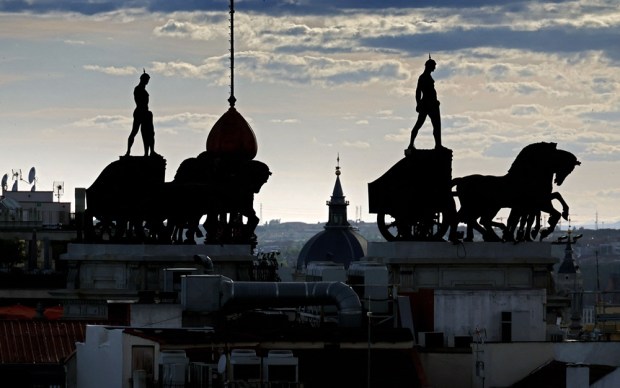I hope the proposals from the one- man committee of inquiry to make the ABC and SBS ‘more commercial’ are rejected. It is superficially attractive to charge a fee for access to reruns of news and current affairs programmes on TV and radio, allow more advertising on the SBS, form joint partnerships with commercial broadcasters, show programmes on additional ‘platforms’ and new-fangled ‘devices’, create yet another government company to run back-end services, have more investment in internet delivery and expand FM broadcasts. They all have a rugged, real world tone about them and a tinge of free enterprise and hold out the hope that making the ABC and SBS more businesslike will enable us to cut their budgets and might also lessen the stranglehold they have on broadcasting and official opinion-making in Australia. None of this will happen. What the proposals will do is make both organisations much stronger and pervasive, continue to blur the distinction between private and public enterprise and expand state-owned broadcasting to the prejudice of the private sector.
All of the proposals strengthen the government broadcasting behemoths and guarantee a never- ending increase in their power, influence and cost to the taxpayer. Worse, they perpetuate a confusion of functions; a lean, efficient public broadcaster is essential, but it does not need to be a publishing empire, into every gimmick and using every platform; it does not need to be an evangelist for one official view on every issue; it does not need to be an event manager, shopkeeper, investigative unit or polling company. It should be financed publicly but modestly, not sap private sector resources, mop up advertising revenue and destroy commercial rivals as has been done and as will continue under these proposals. It should not be made more commercial, but less. It should not be expanded, but pruned back to more realistic functions.
But its expansion continues. Thus, the ABC has started yet another government radio station, 2JJ; first we had Double J, then Triple J and now we have 2JJ back again, but of course keeping Triple J as well, for the ABC never surrenders an inch of territory. At the same time, it has started a new online magazine, the White Paper, a sort of Radio National hymn book to promote the evils of globalisation, drones, free enterprise think-tanks and paid for by you, the ever-generous source of all public sector largesse. But was there a need in the market for either of these endeavours? Did they have to find their way through the labyrinthine maze of government approvals, like the private sector? Did the media ownership rules apply? Of course not. Like Topsy, these organisations continue to grow and commercialism will give their expansion a good kick along.
What also strikes me is the naivety with which some have received the proposals by suggesting the ABC and SBS will henceforth need less money and will therefore become less of a burden on the public purse. As the judge said of the notion of the second marriage, this is the triumph of hope over experience. They will need more money to implement the proposals and, as we know from bitter experience, once a public body has been given money, you can never take it away. Oh, by the way, I actually like the ABC and SBS and many of their programmes. But I live in a free enterprise democracy and I do not want the ABC and SBS to be so expensive, so doctrinaire and so unnecessarily duplicating the work of the private sector.
But it is good to see Fairfax getting into the swing of things. One of their top executives announced this week that a colleague, Sean Aylmer, had been appointed to run Fairfax’s ‘news and business verticals’. I had never thought of the Age and the SMH as verticals, except perhaps as being in vertical decline. Speaking of the wonders of language, I was also reflecting the other day what I could say politely about the Uruguayan soccer player Suárez who took a bite out of a member of the Italian team. Then I heard they are making a film of the whole disgraceful incident, called The Hunger Games.
I see we are having another summit of the cultural elite who remain convinced that we cannot run our own lives without the guidance of our betters, the assorted academics, politicians and celebrities who always know better about everything. This one is run by the Chancellor of the ANU Gareth Evans and is for ‘leaders’ who will be thrown into a ‘highly interactive environment’ and come out solving all of our problems. Let us hope they do not get impaled on any Fairfax verticals while they are being thrown around. Anyway, the leaders have apparently been acquired as a job lot from central casting and include everyone from Heather Ridout to Harold Mitchell, with Ziggy, Terry and Graeme and the usual suspects all pulling their weight. The big issue for the summit is that we are facing ‘a vastly more competitive world’. No! Get away with you! But at least these are honest celebrities, as what they are after is ‘creating elite consensus’ and a ‘global mindset’. That’s a relief; a one world elitist mindset will see us through this harsh, competitive world.
Got something to add? Join the discussion and comment below.
Get 10 issues for just $10
Subscribe to The Spectator Australia today for the next 10 magazine issues, plus full online access, for just $10.
You might disagree with half of it, but you’ll enjoy reading all of it. Try your first month for free, then just $2 a week for the remainder of your first year.














Comments
Don't miss out
Join the conversation with other Spectator Australia readers. Subscribe to leave a comment.
SUBSCRIBEAlready a subscriber? Log in